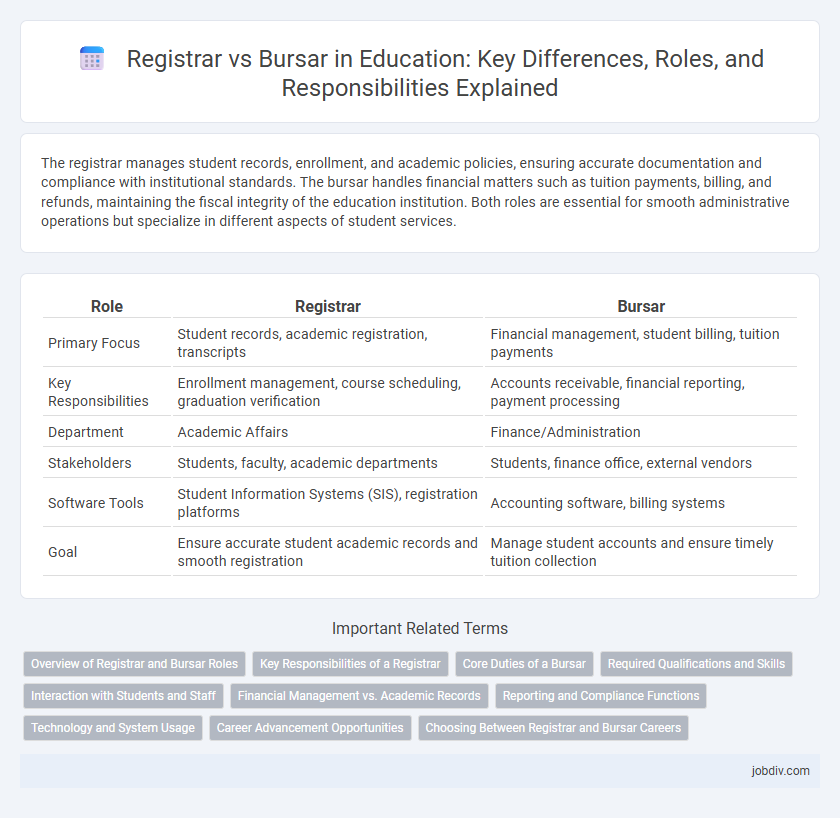The registrar manages student records, enrollment, and academic policies, ensuring accurate documentation and compliance with institutional standards. The bursar handles financial matters such as tuition payments, billing, and refunds, maintaining the fiscal integrity of the education institution. Both roles are essential for smooth administrative operations but specialize in different aspects of student services.
Table of Comparison
| Role | Registrar | Bursar |
|---|---|---|
| Primary Focus | Student records, academic registration, transcripts | Financial management, student billing, tuition payments |
| Key Responsibilities | Enrollment management, course scheduling, graduation verification | Accounts receivable, financial reporting, payment processing |
| Department | Academic Affairs | Finance/Administration |
| Stakeholders | Students, faculty, academic departments | Students, finance office, external vendors |
| Software Tools | Student Information Systems (SIS), registration platforms | Accounting software, billing systems |
| Goal | Ensure accurate student academic records and smooth registration | Manage student accounts and ensure timely tuition collection |
Overview of Registrar and Bursar Roles
The Registrar manages student records, enrollment processes, and academic scheduling, ensuring accurate transcript maintenance and compliance with institutional policies. The Bursar oversees financial operations, including tuition billing, fee collection, and payment processing, dedicated to managing student accounts and campus financial transactions. Both roles are essential for smooth administration, with the Registrar focusing on academic data integrity and the Bursar handling fiscal responsibilities within educational institutions.
Key Responsibilities of a Registrar
A Registrar oversees student enrollment, maintains academic records, and manages course scheduling to ensure smooth academic operations. They handle the verification of transcripts, process graduation applications, and enforce academic policies to support student progress. Accurate data management and compliance with educational regulations are fundamental responsibilities of a Registrar in higher education institutions.
Core Duties of a Bursar
The core duties of a bursar involve managing the financial operations of an educational institution, including overseeing student billing, tuition fee collection, and disbursement of funds. They are responsible for maintaining accurate financial records, preparing budgets, and ensuring compliance with fiscal policies. The bursar plays a critical role in financial planning and supporting the institution's economic stability.
Required Qualifications and Skills
Registrars typically require a bachelor's degree in education, business administration, or a related field, along with strong organizational and data management skills to handle student records and compliance with educational regulations. Bursars often need a background in finance or accounting, such as a degree in accounting or finance, plus proficiency in budgeting, financial analysis, and using accounting software to manage institutional funds and student billing. Both roles demand excellent communication abilities and attention to detail to ensure accurate record-keeping and financial transactions within educational institutions.
Interaction with Students and Staff
Registrars primarily manage student records, course registrations, and academic policies, ensuring seamless communication with faculty and students regarding enrollment and transcripts. Bursars handle billing, tuition payments, and financial accounts, frequently interacting with students and staff to resolve payment issues and provide financial information. Both offices collaborate closely but serve distinct roles in supporting the administrative and financial needs of the educational institution's community.
Financial Management vs. Academic Records
The Registrar is responsible for managing academic records, including student enrollment, grades, and transcripts, ensuring accurate and secure documentation of academic progress. In contrast, the Bursar oversees financial management, handling student billing, tuition payments, and campus financial accounts to maintain fiscal responsibility. Both roles are essential in supporting the institution's operational efficiency by maintaining precise records and managing monetary transactions.
Reporting and Compliance Functions
The Registrar manages academic records and ensures compliance with educational regulations, maintaining accurate student data for reporting to accreditation bodies and government agencies. The Bursar oversees financial reporting, including tuition billing, payment processing, and adherence to fiscal policies set by regulatory authorities. Both roles are critical for institutional compliance, with the Registrar focusing on academic data integrity and the Bursar on financial accountability.
Technology and System Usage
Registrars utilize integrated student information systems (SIS) to manage enrollment, academic records, and scheduling, ensuring data accuracy and compliance with institutional policies. Bursars rely on advanced financial management software to process tuition payments, billing, and refunds, enhancing transaction security and efficiency. Both roles increasingly adopt cloud-based platforms and automation to improve operational workflows within educational institutions.
Career Advancement Opportunities
The Registrar typically manages student records, enrollment processes, and academic policies, providing career advancement opportunities in higher education administration and policy development. The Bursar focuses on financial operations, including tuition billing and payment processing, offering pathways to roles in financial management, auditing, and higher education finance leadership. Both positions provide specialized skills that can lead to senior administrative roles within universities or colleges.
Choosing Between Registrar and Bursar Careers
Choosing between registrar and bursar careers depends on your interest in student records management or financial administration within educational institutions. Registrars focus on academic records, enrollment, and compliance with educational policies, while bursars handle billing, tuition payments, and budget management. Evaluating skills in data accuracy versus financial oversight helps determine the best fit for professional growth in education administration.
Registrar vs Bursar Infographic

 jobdiv.com
jobdiv.com